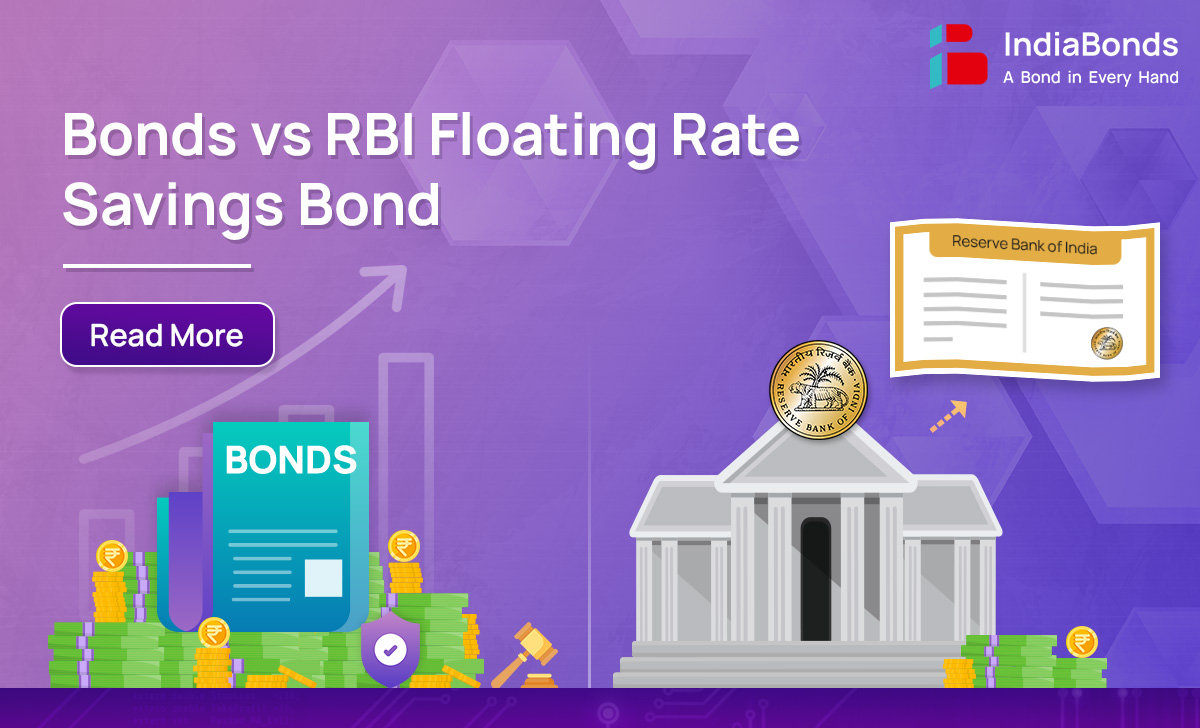Bonds vs. RBI Floating Rate Savings Bonds

Introduction
When you speak about investments, the first thought that pops into people’s minds is investing in stock markets. Stock markets can be exciting as individuals can become wealthy overnight. However, it comes with its fair share of risk. Share prices can drop as quickly as they increase, wiping out all of your hard-earned money and leaving you without any money. While bonds and RBI savings bonds are now regarded as reliable investment options by many, they might not have had the same attractiveness initially. To the average individual, the jargon seems obscure, and many find it uninteresting; this is especially true during thrilling bull markets. However, Bonds and RBI savings bonds are recognized for their stability and safety, and investors include bonds in their portfolios for this reason. Read further to take a deep dive into the topic.
What are RBI savings bonds?
RBI bonds are among the most secure bonds to invest in. They were introduced in the nation in 2003. RBI bonds are issued by the Government of India and held by citizens of the country. RBI bonds may be purchased through the nationalized banks like Bank of Baroda, State Bank of India, ICICI Bank, HDFC Bank, Axis Bank, IDBI Bank etc. Investors can also purchase RBI bonds from the Stock Holding Corporation of India Limited.
Features of RBI Bonds:
Maturity Time:
These bonds mature 7 years after the issue date.
Period:
RBI bonds must be repaid after 7 years of the date of issuance. Premature redemption is allowed for certain RBI bonds for senior citizens.
Date of issue:
It is the date of receiving subscription payment in cash (up to Rs. 20,000) or the date on which funds from a check or draught are realized.
Premature redemption:
After a lock-in period of 4, 5, or 6 years, the facility becomes available to investors of 80 years or older, 70–80 years, and 60–70 years, respectively.
Limit of investment:
The minimum limit is Rs. 1000, and it can increase as multiples thereof without any maximum limit.
Bank statement:
Bank account information is required to enable direct payment of interest on the bonds and maturity value to investors.
Nomination Center:
According to the terms of the Government Securities Act, 2006, and the Government Securities Regulation, 2007 (published in Part III, Section 4 of the Gazette of India on December 1, 2007), the sole holder or all joint holders may designate one or more individuals as nominees.




Why invest in RBI Bonds?
RBI bonds are the safest currency investments because the government guarantees them. Their interest rate is comparable to that offered by banks.
Here are some benefits of RBI savings bonds:
- You want a long-term annuity: RBI bonds have maturity of up to 7 years and provide reasonable yields.
- You want better returns: The interest of RBI Floating Rate Savings Bond is 7.15% (as on 1st January 2022 to 30th June 2022 period). These bonds give slightly better returns than FDs.
What are the benefits of investing in bonds?
When businesses want massive capital for growth, they issue bonds. And when the government requires funds for social services and infrastructure funding, it issues Government Bonds. Investors contribute to the funding by lending a percentage of the cash required. Bonds are comparable to loans in that the investor serves as the lender. The issuer is the firm selling the bonds. The following are some points in favor of why bonds should be a part of your investment portfolio.
1. Higher Returns:
In comparison to RBI Savings Bonds, High Yield Bonds give higher returns with yield of up to 12% p.a.
2. Bonds generate regular higher predictable income:
While many assets provide some income, bonds typically deliver the best and most consistent cash flows. Even when interest rates are low, you have many alternatives for building a portfolio matching your income requirements. High-yield bonds and emerging market debt are examples of these strategies.
3. Bonds provide diversification:
“Don’t put all your eggs in one basket,” is a wise advice when it comes to your investments. This is especially true for investors. More crucially, bonds may assist equity investors in maintaining their wealth in case the stock market falls.
4. Bonds protect the principal:
Bond investments are ideal for people who are conservative in their investment approach, have a limited appetite for risk and are focused at achieving growth while preserving their capital. For example, this may apply to a person who is about to retire or a parent whose kid is entering college. A diversified bond portfolio is less likely to incur substantial losses.
Difference between bonds and RBI savings bonds:
| Basis | Bonds | RBI Savings Bonds |
| Types | Municipal, corporate, government, tax-free bonds are some of the types of bonds. | RBI saving bonds is already a type of bond. |
| Liquidity | They can be traded | Not Tradable & not Transferable |
| Maturity Period | A short-term bond matures in 1–3 years; a medium-term bond matures in 4–7 years; a long-term bond mature in more than 7 years. | RBI bonds mature in 7 years. RBI bonds for senior citizens allow premature redemption. |
| Eligibility | Indian citizens, corporates and NRIs can invest in Bonds. | Resident individuals and HUFs are eligible to invest in RBI Floating Rate Bonds. |
| Floating Interest Rate & Reset Criteria | Interest payable monthly, quarterly, semi-annually, annually or cumulative depending on the bond. | Interest payable half-yearly in January & July each year. The coupon rate payable for next half-year is generally reset in January and thereafter in July. |
Conclusion
Both Bonds and RBI Savings Bonds are a reliable source of investment. However, Bonds carry with it more flexibility and pay much higher returns in comparison to RBI savings bonds which make it a more attractive investment alternative to consider.
FAQs:
What is the minimum and maximum investment limit in the RBI Floating Rate Savings Bonds?
The Bonds are issued for a minimum amount of Rs. 1000/- (face value) and in multiples thereof. There is no maximum limit for investment.
Can you have a nominee in RBI Savings bond?
Yes, nomination facility is available in these bonds.
Do Bonds give higher returns than RBI Savings Bonds?
The interest of RBI Floating Rate Savings Bond is 7.15% (as on 1st January 2022 to 30th June 2022 period while bonds such as high yield bonds help you earn on an average returns close to 12% p.a.
Are RBI Bonds superior to fixed deposits?
There is no cap on how much money investors can put in RBI bonds.
Disclaimer: Investments in debt securities/ municipal debt securities/ securitised debt instruments are subject to risks including delay and/ or default in payment. Read all the offer related documents carefully.
















































